We include products in articles we think are useful for our readers. If you buy products or services through links on our website, we may earn a small commission.
Does Sugar Cause Inflammation?

Inflammatory diseases are the leading causes of death worldwide. And sugar consumption has skyrocketed over the last 100 years. Is this a coincidence? Or does sugar cause inflammation that may be contributing to modern, inflammatory diseases?
In this article, we’ll explore the links between sugar, inflammation, and disease. We’ll also offer some ways to protect yourself from the possible dangers of sugar in your diet.
Table of Contents
What is Inflammation?
Before detailing the connection between sugar and inflammation, let’s take a moment to elucidate what exactly inflammation is.
You may be surprised to hear that inflammation on its own is not a bad thing. In fact, it’s our body’s natural way of fighting infection and healing injuries. [1]
We evolved the process of inflammation as an immune response that helped us survive long before we invented modern medicines like antibiotics.
An inflammatory response entails white blood cells and other immunological chemicals being released into body tissue. Blood flow is increased to areas in need, resulting in tell-tale heat and swelling.
In short durations, inflammation is necessary and helpful. But when our bodies are constantly subjected to stressors and toxins (like sugar) the result is chronic inflammation that damages healthy tissue rather than healing damaged tissue.
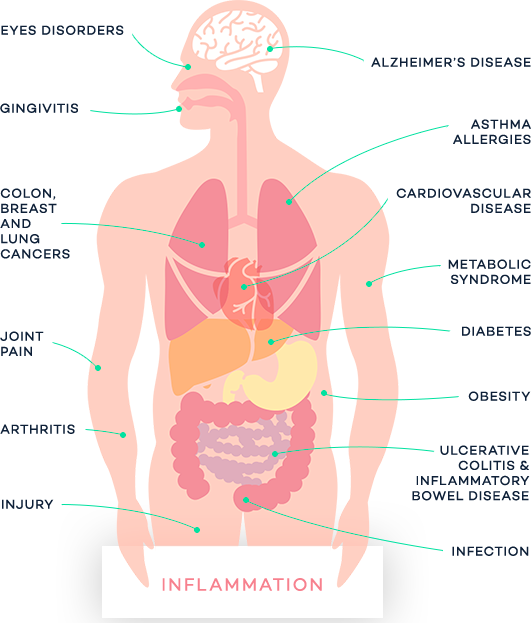
Sugar, Chronic Inflammation, and Modern Diseases
Our modern lifestyles are loaded with things that provoke inflammation. Perhaps none more potent than the modern foods we eat–most of which contribute to extremely high levels of sugar intake.
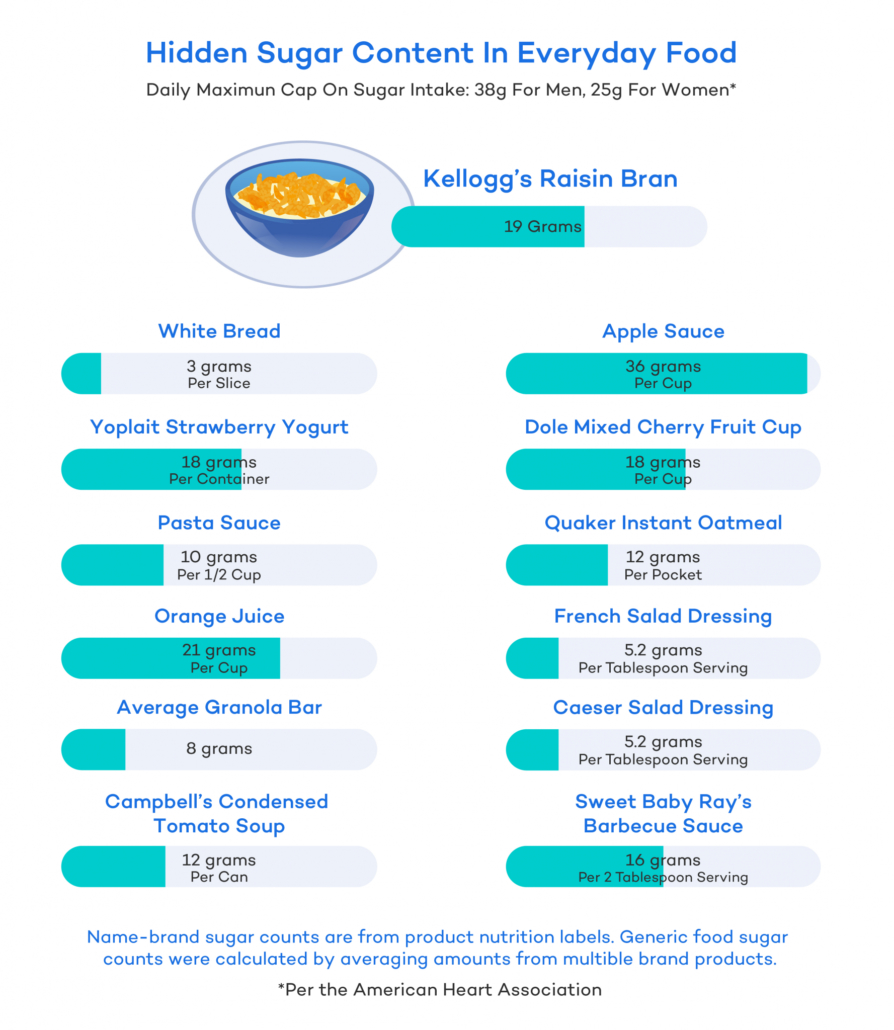
All grains, vegetables, fruits, and anything “plant-based” is a high-carb food. And all carbs are sugar no matter where they come from.
In fact, the average American eats 126 grams of sugar a day, and it’s likely that children consume even more. [4]

Rise of Diseases Related to Chronic Inflammation
According to the World Health Organization (WHO), chronic inflammatory diseases are the leading causes of death worldwide. These researchers discovered that 2
- 60% of Americans have at least one chronic inflammatory condition
- 42% of Americans have more than one chronic inflammatory condition
- 12% of American adults have five or more chronic inflammatory conditions
- Worldwide, 3 out of 5 people die from chronic inflammatory diseases, including stroke, respiratory diseases, heart disorders, cancer, obesity, and diabetes
Modern, inflammatory diseases include 2
- Heart disease
- Asthma
- Alzheimer’s disease
- Parkinson’s disease
- Arthritis
- Diabetes mellitus
- Cancer
- Infertility [8]
- Respiratory diseases
- epithelial cell cancers
- inflammatory diseases (including autoimmune diseases, bowel disorders, osteoporosis, infertility, and more)
Researchers forecast that these diseases will continue to increase over the next 30 years, largely due to our modern diets.
Ancient Genes vs. Modern Stressors
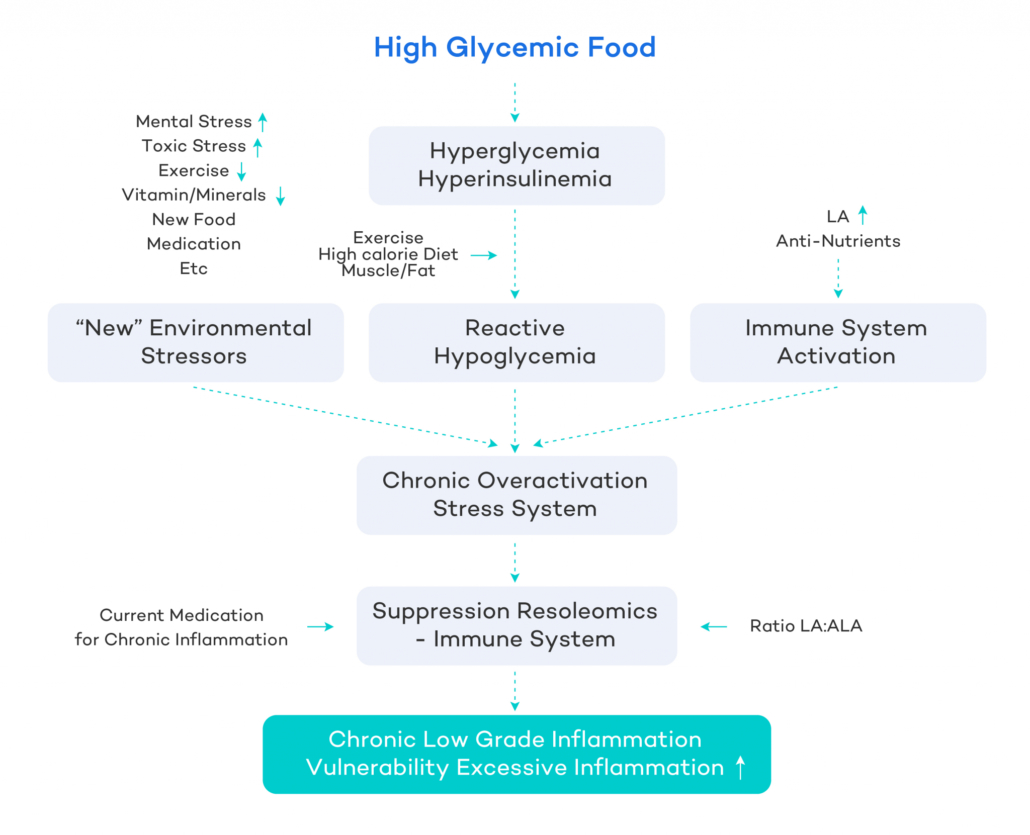
Many researchers refer to modern diseases associated with chronic inflammation as “‘the diseases of civilization” because they were virtually non-existent before the agricultural revolution.
In societies that consume traditional diets that are extremely low in sugars, and high in animal-based fats and protein, these inflammatory diseases are virtually non-existent.4
The idea that modern diseases are caused by a mismatch between the modern foods we eat and our ancestral physiology is called the discordance theory.
It follows that over millions of years, our genetics evolved to regulate inflammatory responses within a hunter-gatherer lifestyle defined by low-carb, high-fat diets. [4][ 5]
Numerous lines of research tell us that for most of human history, humans were hyper-carnivorous apex predators thriving on a diet of mostly fatty meat.1
How Does Sugar Cause Inflammation?
So fat we’ve just been looking at associations between increased sugar intake and increased prevalence of inflammatory diseases.
But is this just a link, or does sugar actually cause inflammation?
Let’s follow the science.
Sugar, Glycation, and Inflammation
One of the studied ways that sugar directly contributes to chronic inflammation is through the process of glycation.
Glycation takes place when sugar molecules bind to proteins, fats, RNA, and DNA.
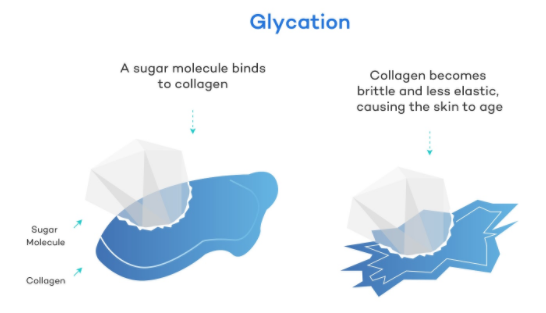
This binding creates toxic compounds called AGEs that have been shown to cause inflammation and oxidative stress.2
Over time a diet high in sugar causes these toxic AGEs to accumulate in various tissues resulting in chronic diseases.4 5
Chronic inflammatory diseases associated with glycation include
- Impaired immune function [8]
- Alzheimer’s disease2
- Kidney failure [9]
- Eye damage and other complications associated with diabetes [10]
- PCOS, insulin resistance [11]
- Endometriosis [12]
- High blood pressure [13]
- heart disease [14]
- Cancer metastasis and resistance to chemotherapy [15]
Sugar Damages the Glycocalyx
The effects of sugar on the glycocalyx is an emerging area of study, in large part because the glycocalyx itself has only recently been discovered.
So what is it?
The glycocalyx is a dense microscopic layer of glucose molecules, proteins, and fats that coats every cell in your body. [16]

This membrane is delicate, and studies who that diets high in sugar can cause significant damage.
For example, only 6 hours of exposure to high blood sugar has been shown to glycocalyx volume by 50%.
Researchers attributed this degradation to oxidation and inflammation caused by high blood sugar. They validated their theory by infusing another load of glucose (carbs) with a powerful antioxidant that protected the glycocalyx from damage. [18]
This matters because the glycocalyx plays an extremely important role in:
- Protecting your cardiovascular system
- Regulating hormones
- Increasing blood flow
Promotes Bacteria that Damages the Gut
Recent studies have revealed that diets high in sugar promote the growth of harmful proteobacteria in the gut. While at the same time sugar reduces beneficial bacteroidetes.
Bacteriodetes protect the gut by defending against endotoxins while reinforcing the gut membrane. 5
By both attacking and weakening the gut membrane, sugar promotes intestinal permeability, AKA leaky gut. Leaky gut allows plant toxins, sugars, and food particles to enter the bloodstream and travel to other parts of the body leading to inflammatory immune response. 5 13
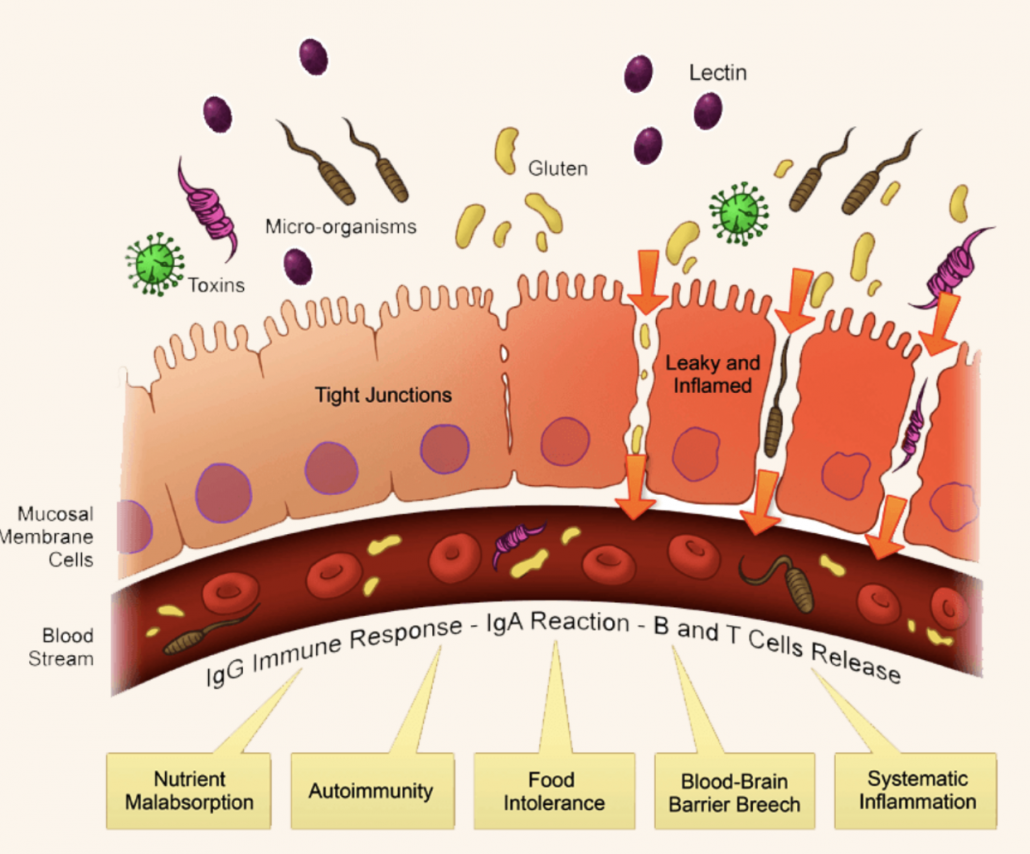
Increases “bad” LDL cholesterol sugar indirectly increases inflammation by increasing “bad” LDL cholesterol. High levels of LDL has been associated with increased C-reactive protein, a common marker of inflammation. 6 14
Sugar, Inflammation, and Heart Disease
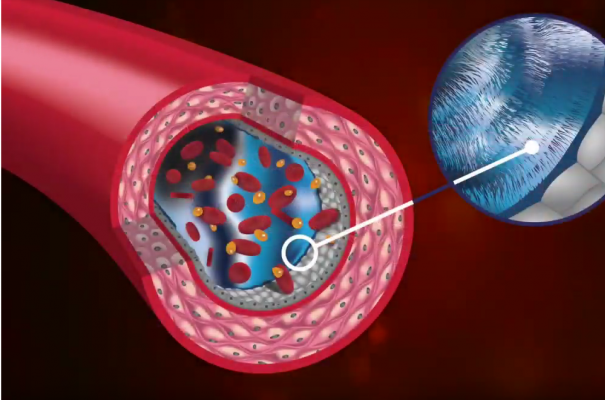
High sugar intake has been shown to increase the risk of developing heart disease. [64]
Researchers hypothesize that this increased risk is due to the combination of negative effects associated with sugar including increased inflammation, higher triglycerides, and higher blood pressure. [65]
Other studies show that those consuming sugary drinks is linked to atherosclerosis. [66]
One study looking at 30,000 people found that participants who consumed around twice as much sugar as the baseline had a 38% greater chance of dying from heart disease. [67]
Other Studies Linking Sugar with Inflammation
A study comparing obese and overweight women on a high-carb diet with those on a low-carb, high-fat diet, found that the high-carb diet was associated with increased markers of 1
A study on participants with type 2 diabetes comparing the effects of a low-carb vs. a low-fat diet found that though weight loss was the same across both groups, the low-carb diet resulted in significant reductions in inflammation. 2
A study looking at the effects of sugar in soda found that consuming only one 375 ML soda (40 grams of sugar) per day significantly increased inflammatory markers along with insulin resistance and LDL cholesterol and led to weight gain.6
Numerous other studies have found that consuming added sugar and refined carbohydrates increases inflammation. 9 10 11
Does Sugar Cause Inflammation: The Bottom Line
Numerous studies link consuming sugar to increased inflammation.
Sugar causes inflammation by
- Binding to cells, DNA, RNA, and proteins in the process called glycation
- Damaging the glycocalyx–a delicate protective membrane coating every cell in the body and regulating important functions, including cardiovascular health and immune system response
- Promoting harmful bacteria and reducing protective bacteria in the gut leads to intestinal permeability
- Increasing “bad” LDL cholesterol
Considering the many routes by which sugar promotes inflammation in the body, it is no surprise that our modern high-carb diets are linked to numerous debilitating and deadly inflammatory diseases. Epidemic and increasing incidences of heart disease, type-2 diabetes, epithelial cell cancers, Alzheimer’s, Parkinson’s, PCOS, osteoporosis, arthritis, and infertility are all likely linked to modern high-sugar diets.
It’s worth noting that industrial vegetable oils have also been linked to increased inflammation and may be even more inflammatory than sugar.5 6 7
It is likely that vegetable oils work in conjunction with sugar to promote chronic inflammation.




















